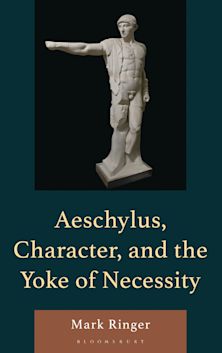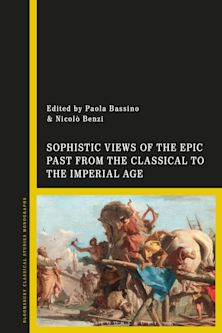- Home
- ACADEMIC
- Classical Studies
- Ancient Philosophy
- Hermias: On Plato Phaedrus 227A–245E
Hermias: On Plato Phaedrus 227A–245E
Hermias: On Plato Phaedrus 227A–245E
You must sign in to add this item to your wishlist. Please sign in or create an account
Description
This commentary records, through notes taken by Hermias, Syrianus' seminar on Plato's Phaedrus, one of the world's most influential celebrations of erotic beauty and love. It is the only Neoplatonic commentary on Plato's Phaedrus to have survived in its entirety. Further interest comes from the recorded interventions by Syrianus' pupils - including those by Proclus, his eventual successor as head of the Athenian school, who went on to teach Hermias' father, Ammonius.
The first of two volumes of Hermias' commentary, the chapters translated here discuss the argument that the soul can be proved immortal as being the self-moving source of eternal motion. Aristotle explicitly disagreed with Plato on this treatment of the soul and Syrianus, having previously (in a commentary on the Metaphysics) criticised Aristotle severely when he disagreed with Plato, feels obliged here, too, to address the apparent disagreement. This new translation is thus vital for understanding Syrianus' attitude to Aristotle.
Table of Contents
Conventions
Introduction
Departures from Lucarini and Moreschini's Text
Translation
Notes
Bibliography
English-Greek Glossary
Greek-English Index
Subject Index
Product details

| Published | 05 Apr 2018 |
|---|---|
| Format | Ebook (PDF) |
| Edition | 1st |
| Extent | 328 |
| ISBN | 9781350051898 |
| Imprint | Bloomsbury Academic |
| Series | Ancient Commentators on Aristotle |
| Publisher | Bloomsbury Publishing |
About the contributors
Reviews
-
Accurate and fluid, reaping the full benefits of its German predecessor and surpassing it in many cases. It is also copiously annotated, with over 800 notes for 126 pages of translation. This heavy annotation is useful given how little the Scholia have been studied and how many passages there are that seem more like a series of crabbed notes than pieces of polished exegesis.
Bryn Mawr Classical Review
-
An English translation of the commentary on Plato's Phaedrus by Hermias (c. 410-450 CE) has been needed, and thankfully has now been provided-at least the first half of it-and in good form … Baltzly and Share have done a commendable job … The translation is eminently faithful, accurate and readable … An indispensable addition to the Platonic scholar's bookshelf as well as to the study of late antique thought and culture in general.
The Classical Journal
-
The edition shows mastery of the primary and secondary sources of Neoplatonic literature ... It offers more than a precise and accurate translation of Hermias' scholia on Plato's Phaedrus. It revisits with critical yet fresh and enthused eyes the importance of Hermias' commentary in the Neoplatonic tradition and the history of philosophy. Hermias' scholia receive the deserved scholarly attention in light of his philosophical contribution to Neoplatonic literature not merely as a pupil and follower of Syrianus' teaching but as a significant thinker who was familiar with the legacy of the Platonic tradition and its fundamental philosophical principles.
The Classical Review

ONLINE RESOURCES
Bloomsbury Collections
This book is available on Bloomsbury Collections where your library has access.



































